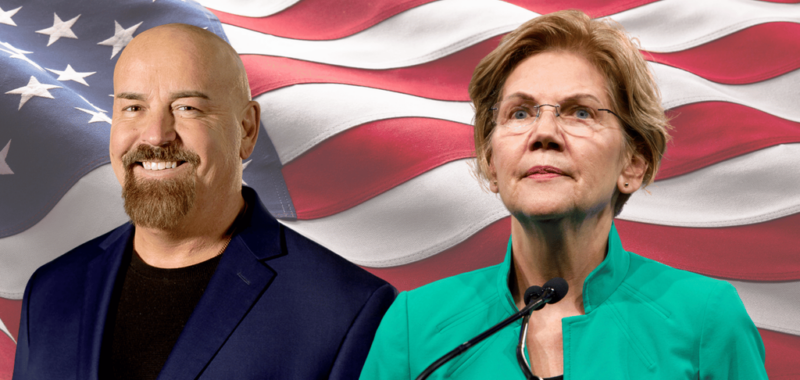Following John Deaton’s Republican primary win in Massachusetts on Tuesday, the crypto attorney is set to square off against Senator Elizabeth Warren—both at the ballot box and on the debate stage.
In a Thursday post on Twitter (aka X), Deaton challenged Warren to five “single-issue debates,” on topics including inflation, the debt crisis, and the economy. Warren told the Associated Press in an email Wednesday that the Democratic incumbent has agreed to two debates in October.
On the campaign trail, Deaton has styled himself as a “common sense” alternative to Warren, highlighting his service as a U.S. Marine and father. In crypto circles, he’s cultivated a reputation as a prominent legal mind who once fought regulators on behalf of XRP investors.
In an interview with Fox Business host Maria Bartiromo, Deaton said Thursday that Massachusetts’ independent voters will ultimately tilt the election in his favor. One of Warren’s only skills, he said, is “fighting against the rich and the wealthy.”
Leading up to the Primary Election, I agreed to FIVE DEBATES against my Primary opponents. Last night, I issued a challenge to @ewarren to also agree to FIVE single issue debates, including one regarding women’s reproductive rights and abortion. The country faces multiple crises… pic.twitter.com/41UFPk5aOW
— John E Deaton (@JohnEDeaton1) September 4, 2024
Deaton, who moved to Massachusetts this year from Rhode Island, hasn’t staked his candidacy on the regulatory treatment of digital assets. Meanwhile, Warren has gained a reputation among crypto advocates as a high-profile skeptic, who has warned against the dangers of “shadowy super coders.”
A longtime professor at Harvard Law School, Warren became Massachusetts’ first female Senator after defeating Scott Brown, an incumbent Republican, in 2012. That victory was followed up by an election win in 2018, when she bested Republican nominee Geoff Diehl.
Warren, who campaigned for president in 2020 on a progressive platform, said she’s “not afraid” of Deaton’s Senate bid in February. In an email to prospective donors, she said “the crypto lobby has put a target on my back” for trying to protect consumers from crypto scams.
Pro-crypto super PACs have ponied up hefty sums this election cycle to support industry-friendly politicians—and stifle those that are critical of the space. For example, Fairshake spent $10 million against U.S. Senate candidate Katie Porter in California (per OpenSecrets), and she ultimately fell short in California’s nonpartisan primary to Democratic Rep. Adam Schiff and Steve Garvey, a Republican and former Major Baseball League player.
Last month, the nonprofit consumer rights advocacy group Public Citizen found that crypto firms, led by Ripple and Coinbase, had collectively put $119 million toward influencing federal elections. The figure represented nearly half of all corporate cash floating around this election cycle.
So far, Warren has raised $18.8 million from donors, while Deaton has secured $1.7 million. In terms of outside spending, $1.3 million has gone directly to supporting Deaton from the Commonwealth Utility Fund. The super PAC has received $1 million from Ripple.
In a primary race featuring three other Republican candidates, Deaton was the only one to receive support in the form of outside spending. Warren ran unopposed.
While Deaton’s primary victory places him head-on against Warren, the pro-crypto lawyer may face a steep climb in surmounting Warren’s notable support for a third term in the state.
A poll conducted by UMass Amherst in May found that voters skew heavily toward Warren over Deaton in the deep-blue state, per Real Clear Polling. Warren led Deaton by 23 points, which was well beyond the poll’s margin of error, but that was before Deaton became her lone opponent.
Warren’s campaign did not immediately respond to requests for comment from Decrypt.
“I am truly humbled by the tremendous outpouring of support and grateful for the faith the voters have placed in me,” Deaton said in a statement. “Tomorrow, we begin the next phase of the campaign—an effort that will hold Elizabeth Warren accountable.”
Edited by Andrew Hayward

